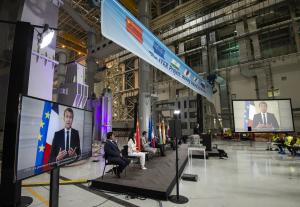THEY SAID
Presidency of the Council of the European Union— statement by Angela Merkel read by Michael Meister, Parliamentary State Secretary
"The ITER project involves seven partners [...] This fact makes one thing clear: without the contributions made by each individual ITER partner we would not have reached the milestone we are celebrating today."
European Union — Commissioner for Energy Kadri Simson
"But today we celebrate more than just a technical milestone. I would like to highlight three things in particular. First, the strength of international collaboration; second, ITER represents the determination of the EU in the fight against climate change; finally, I would like to talk about the importance of continuing to support projects like these in challenging times. The Covid-19 pandemic has forced us all to readjust our priorities and Europe is no exception."
China — Statement by President Xi Jinping, read by Minister of Science and Technology Wang Zhigang
"Science is not bound by national borders, and innovation is a never-ending endeavour. International cooperation on science and technology is critical to humanity's response to global challenges [...] The ITER project, one of the most important international scientific collaborations in the world, embodies human desire for the peaceful use of fusion energy [...] Together, let us promote science, technology and innovation across the globe and make new contributions to the betterment of lives in all countries and sustainable development of the whole world."
India — Statement by Prime Minister Narendra Modi, read by Ambassador Jawed Ashraf
"ITER is a project of an extraordinary vision and ambition and of unparalleled scale and complexity. [...] It is attempting a task of cosmic proportions. [...] The project is also very special because it involves international collaboration at an unprecedented level. This shared endeavour for a common good is a perfect symbol of the age-old Indian belief that the entire world is one family."
Japan — Statement by Prime Minister Shinzo Abe, read by Hagiuda Koichi, Minister of Education, Culture, Sports, Science and Technology (MEXT)
"I, as Japan's Prime Minister, believe disruptive innovation will play a key role in addressing global issues, including climate change, and realizing a sustainable carbon-free society. [...] I sincerely hope the ITER project will continue its solid progress through the strong solidarity among the ITER Members, despite the COVID pandemic."
Korea — President Moon Jae-in
"Just as we have always done in the course of discovering new frontiers in science and technology, ITER also had to put up with numerous challenges and undergo countless trials and errors. We are able to overcome such hurdles and reach the stage of machine assembly because the seven member countries chose to pool their wisdom with ITER playing a central role. It is a proud achievement made possible by solidarity and cooperation among the international community. [...] Dazzling stars in the night sky shine with fusion energy. Once we pool all the wisdom that the world has to offer, we will be able to have an artificial sun that lights our path towards the future."
Russia — Statement by President Vladimir Putin, read by Alexey Likhachev, Director-General of Rosatom
"Despite the restrictions due to the coronavirus pandemic, we managed to maintain an uninterrupted pace of work. This gives us good ground to expect the project goals to be achieved on schedule, and in the foreseeable future we will receive a source of energy that is unique in its power and safety; the operation of which will undoubtedly contribute to solving sustainable economic development goals and improving the life quality of millions of people."
United States — Dan Brouillette, Secretary of Energy
"The ITER effort has also helped to renew enthusiasm and optimism about the commercial promise of fusion energy. Several start-up companies across North America have been established in recent years to explore potential concepts of fusion energy. Let's go to work — let's change the world!"



